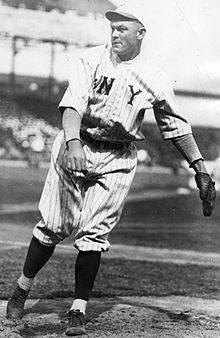Jeff Tesreau
| Jeff Tesreau | |||
|---|---|---|---|
 |
|||
| Pitcher | |||
|
Born: March 5, 1888 Ironton, Missouri |
|||
|
Died: September 24, 1946 (aged 58) Hanover, New Hampshire |
|||
|
|||
| MLB debut | |||
| April 12, 1912, for the New York Giants | |||
| Last MLB appearance | |||
| June 11, 1918, for the New York Giants | |||
| MLB statistics | |||
| Win-loss record | 115–72 | ||
| Earned run average | 2.43 | ||
| Strikeouts | 880 | ||
| Teams | |||
|
|||
| Career highlights and awards | |||
|
|||
Charles Monroe "Jeff" Tesreau (March 5, 1888 – October 24, 1946) was an American Major League Baseball player.
Tesreau initially signed with a minor league team of the St. Louis Browns in 1909. In 1910, his contract was purchased by the New York Giants.
After two years in the minors, Tesreau learned how to throw a spitball, which became his signature pitch. He started the second game of the 1912 season for the Giants. The New York Times wrote, "Tesreau has curves which bend like barrel hoops and speed like lightning. He's just the kind of a strong man McGraw has been looking for." In the 1912 World Series, Tesreau went 1–2 against Boston Red Sox ace Smoky Joe Wood.
In 1912, Tesreau was 17–7 and had a league leading ERA of 1.96. ERA officially became a statistic of Major League Baseball in 1912, and Tesreau along with the American League's Walter Johnson became the first players recognized for leading the major leagues in that category. On September 6 of that season, Tesreau no-hit the Philadelphia Phillies 3-0.
From 1912 to 1917, Tesreau remained a starting pitcher with the Giants. In 1918, he had an argument with manager John McGraw and quit the team in the middle of the season. In 1919, Tesreau refused to play for the Giants, and McGraw refused to trade or release him. Tesreau took a position as baseball coach for the Dartmouth Big Green baseball team of Dartmouth College, a position he held until his death on September 24, 1946. He won 348 games as coach for Dartmouth, often coaching against Joe Wood, who had become the Yale University Yale Bulldogs baseball coach.
...
Wikipedia
